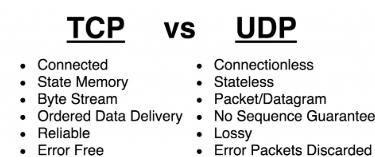
TCP (Transmission Control Protocol) and UDP (User Datagram Protocol) are two core protocols of the Internet Protocol Suite. They serve distinct purposes and have different characteristics:
1. Connection Type
- TCP: Connection-oriented. Establishes a reliable connection between sender and receiver before data transfer starts (via a three-way handshake).
- UDP: Connectionless. Data is sent without establishing a connection, making it faster but less reliable.
2. Reliability
- TCP: Ensures data delivery. It provides error checking, retransmission of lost packets, and guarantees the order of data packets.
- UDP: Does not guarantee data delivery or order. If packets are lost or arrive out of sequence, it doesn’t handle retransmission.
3. Speed
- TCP: Slower due to overhead for establishing connections, error-checking, and retransmission.
- UDP: Faster because it doesn’t perform error-checking or manage packet delivery order.
4. Use Cases
- TCP: Used for applications requiring reliable communication, such as:
- Web browsing (HTTP/HTTPS)
- Email (SMTP, IMAP, POP3)
- File transfers (FTP)
- UDP: Used for time-sensitive applications where speed is critical, such as:
- Live video or audio streaming
- Online gaming
- DNS lookups
5. Header Size
- TCP: Larger header (20 bytes minimum), which adds more overhead.
- UDP: Smaller header (8 bytes), which is more lightweight.
6. Flow Control and Congestion Control
- TCP: Includes mechanisms to manage flow control and avoid network congestion.
- UDP: Lacks flow control and congestion control features.
Summary Table
| Feature | TCP | UDP |
|---|---|---|
| Connection Type | Connection-oriented | Connectionless |
| Reliability | Reliable, ensures delivery | Unreliable, no guarantees |
| Speed | Slower (overhead) | Faster (no overhead) |
| Use Cases | Web, email, file transfer | Streaming, gaming, DNS |
| Header Size | Larger (20 bytes) | Smaller (8 bytes) |
| Flow/Congestion Control | Yes | No |
Both protocols are vital and are used based on the requirements of the application or system being implemented.
Comments are closed